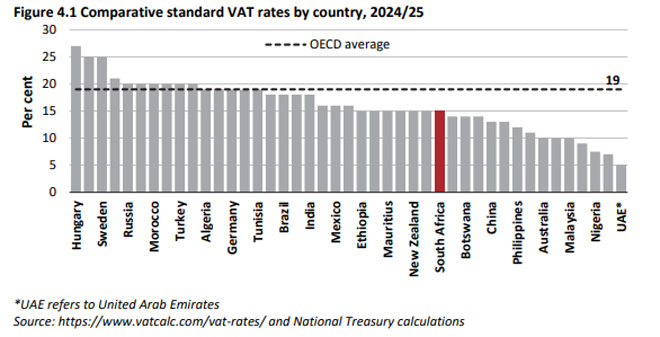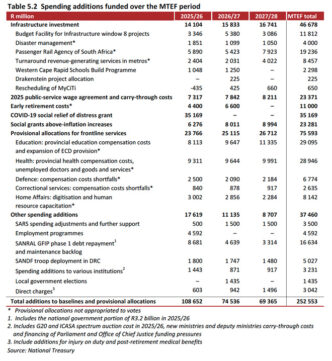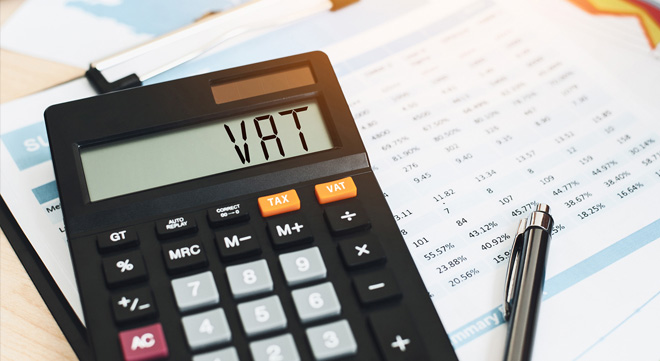What a difference two percentage points can make. For the government, it could mean up to an additional R58 billion in revenue in 2025/26 through an increase in the VAT rate, but will the cost for the average person in the street be too high? Some parties in the Government of National Unity certainly seem to think so.
Following the shocking announcement that the Budget Speech will be postponed to 12 March, the DA was quick to assert its influence, attributing the postponement to the party’s staunch opposition to the ANC’s proposed VAT hike of two percentage points.
Addressing the media yesterday, Khumbudzo Ntshavheni, the Minister in the Presidency, said: “It was neither a DA issue, an ANC issue, a PA issue, or a DA versus ANC, or a PA versus ANC, or IFP versus ANC, it was a Cabinet decision.”
Asked whether the VAT increase was the sole contentious issue in the proposed Budget, Minister of Finance Enoch Godongwana responded: “You can’t just have the 2% alone without discussing what’s going to replace it. What we are grappling with is not necessarily 2% per se. Given the challenges and priorities that we are facing, how do we fund them? That is the debate.”
The announcement of the postponement was met with widespread criticism, with many arguing that the Cabinet should have resolved its issues well before the scheduled Budget Speech – rather than scrambling just hours before the minister was set to go live.
It was clear, however, that the postponement was entirely unexpected. As in previous years, the media was invited to a pre-Speech lockup, where they receive the Budget documents under strict embargo, and reports may be published only once the minister starts speaking. But with the last-minute delay, journalists were left holding sensitive information. Initially, they were told the embargo still applied because the speech had not been delivered. However, in an email sent by National Treasury at 8.30pm last night, they were given the green light to publish what can now only be considered a “draft” version of the 2025 Budget Review.
Tough choices ahead
In the foreword to the Budget Review, National Treasury director-general Duncan Pieterse outlined the government’s plan to strengthen state capacity by improving education, healthcare, and defence, rebuild the South African Revenue Service (SARS), and encourage early retirement to refresh the public sector.
The 2025 Budget also reaffirmed the government’s commitment to macroeconomic stability, which is essential for sustainable growth, by restoring public finances.
However, Pieterse acknowledged that achieving these goals required tough choices – most notably, a two-percentage-point increase in VAT to 17%, set to take effect on 1 April.
As Treasury argued, this increase should not come as a surprise. The Budget Review noted that since 2020, the government has signalled that higher spending must be matched by corresponding revenue measures. In preparing the current tax proposals, all major tax instruments were considered.
“The VAT rate – unchanged since 2018 – remains below the average of peer countries, and raising VAT tends to be less harmful to growth than other tax options.”

To mitigate the impact, the government would introduce “spending support,” including above-inflation increases in social grants, an extension of fuel levy relief, and additional essential food items being zero-rated for VAT.
Currently, 21 food items are VAT-free to make them more affordable for low-income households. From 1 April 2025, this list will expand to include variety meats from sheep, poultry, goats, swine, and bovine animals; specific cuts such as heads, feet, bones, and tongues; dairy liquid blend; and tinned and bottled vegetables.
The 2022/23 Income and Expenditure Survey shows high consumption of these newly zero-rated items among the lowest four expenditure deciles.
Treasury estimated that the additional VAT relief would cost the government about R2bn in forgone revenue in 2025/26.
Where the money is supposed to go
The VAT increase was expected to provide additional funding for essential services, with investments in education, healthcare, early childhood development, and commuter rail services.
Under the section “Medium-Term Fiscal Strategy”, the Budget Review stated that 61% of consolidated non-interest spending would go towards the social wage – covering health, education, social protection, community development, and employment programmes.
“This includes above-inflation increases to social grants to help offset the impact of the VAT increase among vulnerable households,” the Review adds.
The budget for social grants would increase by R23.3bn over the medium term to account for higher costs of living, including the increase in VAT.
Funding “frontline” services (with investments in education, healthcare, early childhood development, and commuter rail services), investing in infrastructure, and extending the Social Relief of Distress (SRD) grant were among the spending pressures that contributed to the government’s proposal to hike the VAT rate.
According to the Budget Review, the government needed R252.6bn for “additional” expenditure over the next three fiscal years: R108.65bn in 2025/26, R74.5bn in 2026/27, and R69.3bn in 2027/28.
The proposed spending additions over the medium term included provisionally allocating R75.6bn to critical frontline services. Of this, R29bn was for the provincial education departments, particularly to pay for the extension of early childhood development. An amount of R28.9bn was allocated to employ doctors after their community service ends and increase the availability of medicines and medical supplies.
The Department of Home Affairs was allocated R81.bn for its digitisation project and to employ additional staff and strengthen the Border Management Authority.
The Department of Defence and the Department of Correctional Services were allocated R6.7bn and R2.6bn, respectively, to meet shortfalls in compensation.
Treasury explained that these allocations were “provisional” because they would be made available to departments only when they demonstrated readiness or met specific conditions. For example, the provisional allocations to address compensation shortfalls in the departments of Defence and Correctional Services would be appropriated to these departments once the extent of their participation in the early retirement programme (see below) had been clarified.
A large slice of the additional spending, R46.7bn, was for infrastructure investments. Of this, R19.2bn was earmarked for the Passenger Rail Agency of South Africa, R8.5bn to address the deteriorating water, electricity, and solid waste services in municipalities, and R11.8bn for infrastructure projects.
Early retirement incentive
Treasury planned to allocate R11bn to incentivise public servants to retire early, without incurring penalties, over the next two years. Of this amount, R4.4bn was set aside in 2025/26 and R6.6bn in 2026/27.
Civil servants who wanted to take up the offer would have to apply, with approvals given only by the relevant executive authority. Up to 30 000 state employees were expected to opt for early retirement, the Budget Review said.
“The plan is to manage headcounts by incentivising employees over 55 years old to retire and moderate compensation spending as younger employees join the public service at entry-level salary grades. Preliminary savings are expected to average R7.8bn per year over the medium to long term.”
Departments would be allowed to retain their savings from this initiative and could use them to address “compensation pressures” and build capacity.
Other items
The other proposed spending additions over the medium term included:
- 2bn to extend the SRD grant until March 2026.
- 4bn for the 2025 public-service wage agreement. The agreement provides for a wage increase of 5.5% in 2025/26 and Consumer Price Index-related increases over the subsequent two years.
- 3bn to increase the value of social grants by more than inflation.
- 4bn to repay the debt of the South African National Roads Agency Limited (SANRAL), of which Gauteng province will pay R13.4bn.
- R5bn for the deployment of South African National Defence Force troops in the Democratic Republic of the Congo.

One side of the debate
The Budget Review outlined the rationale for the proposed two-percentage-point VAT increase, stating that the government carefully considered all major tax options before making its decision.
“VAT is an efficient source of revenue. It is broad-based, and its design is simple with minimal exceptions.”
As a consumption tax, VAT affects all households through price increases, but higher-income households bear most of the burden. According to the Review, more than 75% of VAT revenue comes from households in the top four expenditure deciles – those spending R118 000 or more a year.
“Increasing taxes on consumption through a higher VAT rate will have the least detrimental effect on economic growth and employment over the medium term, relative to increases in personal or corporate income taxes,” Treasury said.
In contrast, raising personal income tax rates is seen as inefficient, because taxpayers adjust their behaviour to lower their tax liabilities.
“Higher personal income tax rates would also reduce the incentive to work and save, with potentially larger negative impacts on the economy.”
Treasury said that despite multiple tax policy measures increasing the personal income tax burden over the past decade, revenue gains have been lower than expected.
“Most recently, the 2024 Budget did not adjust personal income tax brackets or medical tax credits for inflation. South Africa’s personal income tax collection measured as a contribution to GDP, and the top tax rate, are far higher than those of most developing countries.”
Treasury said corporate tax increases are also discouraged, because they could hurt competitiveness while generating less revenue than VAT.
“Corporate taxes make a higher contribution as a percentage of GDP in South Africa than the Organisation for Economic Co-operation and Development and African averages.”
South Africa ranks 13th out of 123 reporting countries for corporate tax as a share of GDP, but, Treasury added, this revenue is volatile, because it depends on commodity prices and economic growth.
The review notes that corporate tax collections are expected to rise with the introduction of the Global Minimum Tax Act, which will increase revenue and reduce profit shifting by large firms.





While this is the only fair option to make sure everyone contributes, I cannot help to wonder how much of those funds will end up in politician’s own pockets in some form of corruptive way. Corruption in our government is so active and obvious, that we don’t trust anything they are implementing. Will these funds really be used for the benefit of the people? Or will it just again end up in the pockets of the politicians, while the people struggle more? Our industries are regulated so harshly to avoid corruption, money laundering etc, but our examples (the government & politicians) break exactly the laws they are trying to enforce on us. Maybe they should first start by getting rid of all the corrupted politicians, and employ politicians who actually are honest, and have integrity. Because I don’t think any of the politicians in any party has the moral qualities to lead a country. Including our president.